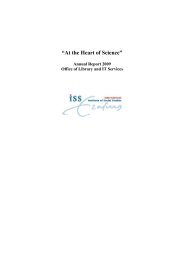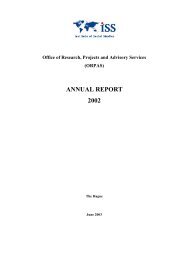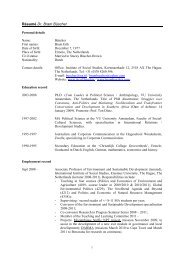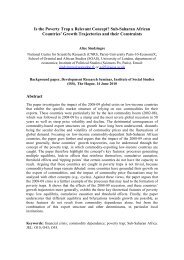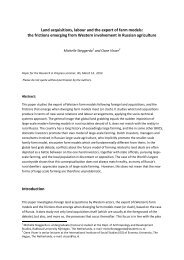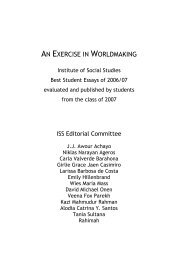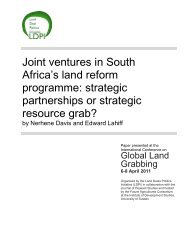AN EXERCISE IN WORLDMAKING 2009 - ISS
AN EXERCISE IN WORLDMAKING 2009 - ISS
AN EXERCISE IN WORLDMAKING 2009 - ISS
You also want an ePaper? Increase the reach of your titles
YUMPU automatically turns print PDFs into web optimized ePapers that Google loves.
130 TISKA YUMEIDA<br />
economies of scale while reducing those of its foreign competitor. Hence<br />
engendering decreasing costs.<br />
Import Substitution Industrialization (ISI) and Export Promotion Industrialization<br />
(EPI) are the policies which support protection policy of<br />
infant industry. ISI is a set of trade and economic policies which make a<br />
country try to reduce its dependency from foreign products through local<br />
products. This policy suggests that state should induce industrialization<br />
by government spending. It was adopted by some highly industrialized<br />
countries, such as the United States (US) until the 1940s. Many<br />
forms of ISI that can be adopted including subsidies, protective barrier<br />
to trade, such as tariffs, an overvalued currency to help manufacturers<br />
import capital goods (e.g. heavy machinery), and not encouraging foreign<br />
direct investment. Through EPI governments help exporters to participate<br />
in exhibitions abroad to promote their products in foreign markets<br />
and sends delegations to export markets to explore new market and develop<br />
the traditional markets. But, as argued by Bardhan and Udry (1999:<br />
190), a time inconsistency problem that afflict such policies in most<br />
countries is that once protected, the infant sometimes refuses to grow<br />
and face competition, and instead concentrates on lobbying for prolonged<br />
protection.<br />
3.2 Policy Implications of the New Growth Theory<br />
The new growth theory emphasizes the importance of increasing returns<br />
to the overall opportunities for economic growth. Increasing returns imply<br />
tremendous opportunities for growth, and the need for policy to deal<br />
with resulting monopolies and market imperfections. The principal objective<br />
of such policies would be to upgrade a country’s production and<br />
export pattern by successively moving up the technology and skill ladder<br />
of products and taking into account the dynamic demand potential in<br />
world markets (Mayer 1996). This objective could be achieved by accumulation<br />
of human capital which enforces an increasing of country’s<br />
productivity.<br />
Mayer (1996: 21) states that successful accumulation of human capital<br />
is not just a matter of sending people to school. Several additional factors<br />
need to be taken into account when designing a policy strategy with<br />
a view to supporting the accumulation of human capital. Giving strong<br />
attention to the quality of education is one factor. Skill acquisition at<br />
school also depends on the quality of learning, rather than just on the



